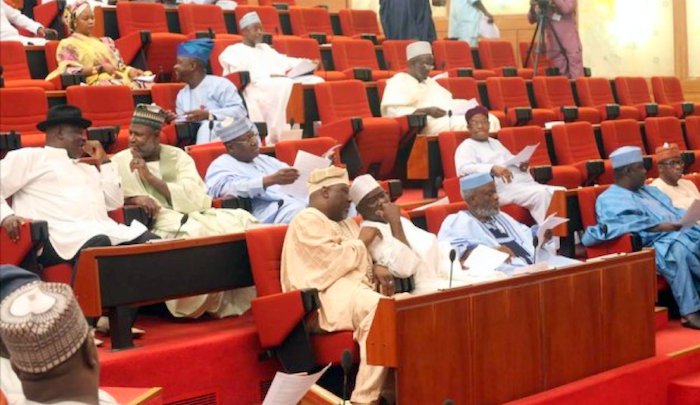The Senate Adhoc Committee on a New National Minimum Wage Bill, 2019, has concurred with the House of Representatives, recommending N30,000 as the accepted minimum wage for the Nigerian workers, against the N27,000 proposed by the Federal Government.
The committee, which is chaired by the Deputy Chief Whip of the Senate, Senator Francis Alimikhena, All Progressives Congress, APC, Edo North, met yesterday at Senate Room 431 New Building, concurred with members of the House of Representatives that had earlier recommended a wage of N30,000.
A source told Vanguard yesterday that at the meeting of the committee, the chairman, Senator Alimikhena, asked all the members to make contributions one after the other on the new minimum wage.
According to the source, all the senators who spoke agreed on N30,000 across board, having taken the bill clause by clause.
Vanguard also gathered that the senators agreed on very stiff punishment for civil servants who do not go to work.
Consequently, a fine of N75,000 was said to be recommended for payment by any erring civil servant.
The senators were said to have complained bitterly about local government workers who abscond from their duty posts, only to wait and come to the secretariat whenever salaries were ready.
The committee, Vanguard learned, would present its report to the Senate at Plenary next Tuesday for passage into law same day.
It would be recalled that the Senate President, Dr. Bukola Saraki, had on Monday, announced that following the absence of the Chairman, Senate Adhoc Committee on New National Minimum Wage Bill, Senator Olusola Adeyeye, APC, Osun Central, the Deputy Senate Majority Whip, Senator Francis Alimikhena, APC, Edo North, would now head the panel in acting capacity.
It would be recalled that the Senate had on 24th January this year, set up an eight- member Adhoc Committee to look at the New Minimum Wage bill after scaling second reading, just as the Bill was referred to the constituted ad- hoc Committee.
The Ad- hoc Committee had the Senate Majority Whip, Senator Olusola Adeyeye, APC, Osun Central, with the Deputy Chief Whip, Senator Francis Alimikhena, APC, Edo North, representing the South South; Senator Abu Ibrahim, APC, Katsina South who is the Chairman of the Senate Committee on Labour; Senator Shehu Sani, PRP, Kaduna Central, representing the North West; Senator Sam Egwu, PDP, Ebonyi North, representing South East); Senator Suleiman Adokwe, PDP, Nasarawa South, North Central) ; Solomon Adeola, APC, Lagos West, representing South West and Senator Binta Masi Garba, APC, Adamawa North, representing North East.
The Committee was given two weeks to conclude its assignment and report back.
Meanwhile, the Chairman, Senate Committee on Local Content, Senator Solomon Adeola (APC, Lagos West), yesterday called for the review of Revenue Allocation Formula by the Revenue Mobilisation and Fiscal Commission as a way of effectively implementing the recommended N30,000 minimum way across all tiers of government.
Making his contribution during a meeting of the Senate Ad Hoc Committee on Minimum Wage chaired by Senator Francis AlimiKhena to consider the Minimum Wage Bill, Senator Adeola supported the recommended N30,000 contained in the National Minimum Wage Bill adding however that the law when passed must be implemented by all the three tiers of government.
In a statement signed by his Media Adviser, Kayode Odunaro, Senator Adeola said: ” I am in support of the recommended minimum wage as it will go a long way in cushioning the challenges faced by workers.
”However, there must be no excuse for non implementation by any tiers of government across the federation. It is in this wise that I call on the Revenue Mobilisation and Fiscal Commission to begin a process that will lead to the review of the Revenue Allocation Formula for all tiers of government to be able to pay the minimum wage when passed into law”.
The senator supported the sanctions contained in the bills for indolent workers stressing that while supporting the minimum wage for workers and improve welfare packages, the civil service at all levels must perform at its best as they are critical in the delivery of dividends of democracy to the people.

